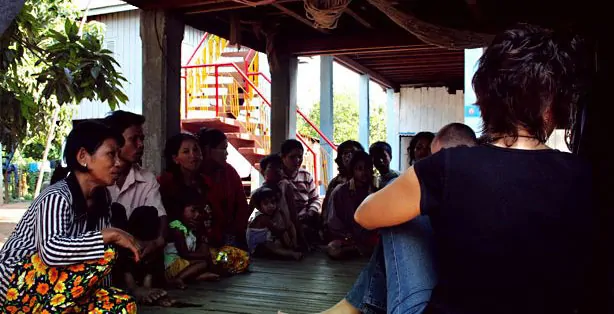Sometimes the victims of terrorism aren’t just those on the receiving end of an attack.
Jake Harriman discovered this while serving as a Marine Corps’ Infantry Platoon Commander and Special Operations Platoon Commander for seven years. During his time in combat, he was struck with the realization that the people doing the daily work of terrorist groups are sometimes misrepresented as evil participants, when in reality their free will has been paralyzed by extreme poverty and oppressive control. “You see a look of desperation in the faces of the people you are fighting. It’s not out of some kind of misplaced sense of hatred for the West; it’s actually out of desperate love for their 2-year-old daughter and 5-year-old son at home who are starving to death.”
Harriman left his prestigious military career and decided to fight terrorism on a different battleground. “I felt that military intervention is certainly necessary, but that I could make more of a dent in the war on terrorism by attacking what I believe to be the biggest contributor of terrorism, which is extreme poverty.”
His realization led him to found Nuru International in 2008. Today, Nuru (a Swahili term for “light, hope”) operates as a “general contractor” for other organizations, coordinating and revising their efforts to eliminate the symptoms of extreme poverty.
Nuru has identified five key areas of a holistic focus: agriculture, water and sanitation, health care, community economic development and education. A third-party research team does extensive investigation and evaluation of organizations on the ground to determine the best models for handling these issues. They’ve even developed a metric system with which to measure and publish their progress. “Transparency and accountability is everything,” Harriman says.
From there, Nuru develops partnerships with other respected NGOs to start Seed Projects that address the greatest needs in each area. The goal of a Seed Project is to empower a district level community (25,000-30,000 people) to become self-sustaining within five years. Beyond that point, dependency upon the organization deepens and makes an exit strategy difficult. A time limit also ensures that the work of Nuru isn’t treated like a handout. “We just try to get people to that next rung, to deliver people out of extreme poverty in which they have no choice,” Harriman explains.
Currently, Nuru is at work in their pilot Seed Project in Kuria, Kenya, where maize crops have increased 300-500 percent and four wells have been drilled. “We treat the poor as our clients, our customers, our peers. These are amazing people that are far more resourceful and intelligent and incredible than I’ll ever be,” Harriman says. He hopes the success in Kenya will open doors in failed states and conflict areas. Future Seed Projects are scheduled for Nicaragua, Malawi, Sri Lanka, Afghanistan, Somalia, Democratic Republic of Congo, China, Yemen and Sedan.
Nuru also hosts annual interactive awareness campaigns, like this year’s Be Hope to Her. During the month of April, college students across the country gather to carry a large bucket of water on their head for several miles, to and from a water source. This activity mirrors the daily practice of Kenyan adolescent girls, who often drop out of school to make time for this labor. Money from Be Hope to Her goes toward drilling deep wells at the area schools, to ensure that young girls get both an education and clean water. Adds Harriman, “If we can put people in the shoes of the extreme poor, it’s a transformational experience.”
To learn more, visit NuruInternational.org.





















